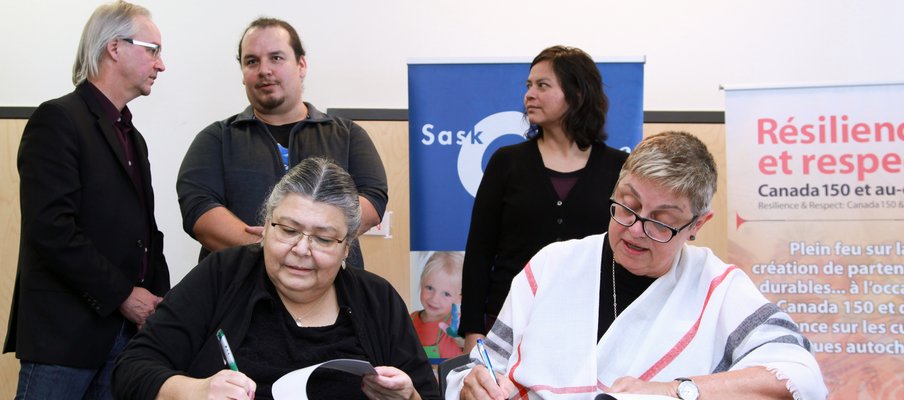
Focused on Sustaining Languages
The new partnership between the Saskatchewan Indigenous Cultural Centre (SICC) and SaskCulture helped deliver nearly one million dollars in funding to language revitalization projects in the province this past year.
In 2017, SICC became the third-party funder in Saskatchewan for the Aboriginal Languages Initiative (ALI) through Canadian Heritage. The ALI funding is aimed at supporting projects that maintain, revitalize and promote First Nations languages. After working together on the Respect and Resilience: Canada 150 and Beyond initiative, SICC approached SaskCulture to partner on the delivery of the ALI program.
“SICC recognized that precious time would be lost getting the funds out to First Nations communities and organizations if they had to build the internal capacity to do so, while continuing its important work on the implementation of the Indigenous Languages Act, at the federal level," explains Damon Badger Heit, SaskCulture Outreach Consultant and Aboriginal Languages Initiative Fund Program Coordinator.
A partnership agreement was signed in January 2018 and work began immediately to determine how best to pool both organizations’ respective areas of expertise, resources and infrastructure to ensure everything was in place to hit the ground running once the ALI funds were available.
“It was clear from the onset that SICC’s strong connection to First Nations communities and organizations in the province was a huge advantage in terms of reaching the right people with information about this funding,” Badger Heit says. “SaskCulture brought on established grant development and implementation process, along with our Online Grant Platform, (OGP), to the table and from there, we just got to work getting the pieces in place to make sure we were ready to get the funds out to the communities as quickly as possible.”
By the time Canadian Heritage handed over the applications for 2018-2019, the partners were ready to implement assessment processes and orient Indigenous Elders and cultural workers to allocate funding using the Indigenous-focused framework and cultural knowledge they were bringing to the process.
“While the grant remains the same,” says Badger Heit, “the assessment, evaluation and communications between funder and community is now being conducted by people with knowledge of the applicant communities, and the distinct needs and languages in this part of the country.” Through this partnership, SICC and SaskCulture are able to provide enhanced services to First Nations communities that historically would have had to work with officers in Ottawa to navigate these funding processes.
Taking on a federal program was no small feat. It meant that for the first ALI intake, SaskCulture had to go back to its roots and administer a robust funding program, using only hard copy applications without the support of its OGP, which is used for all of its other funding programs. It also meant several new processes had to be developed including administrative, outreach and communication tools.
Over the course of 2019, SICC and SaskCulture developed the ALI Adjudication Orientation Manual, the ALI Applicants Handbook, two webinar tutorials to support funding recipients, combined outreach and ALI workshops at the SICC Language Keepers Conference, the development of reporting/monitoring tools, as well as the monumental task of rebuilding and launching ALI online in SaskCulture’s OGP for use by all future applicants to the program in Saskatchewan.
SaskCulture Grants Administrator Catherine Folstad was instrumental in moving ALI into the OGP. She says “this really is a unique partnership in which SaskCulture is able to bring its knowledge and expertise in funding processes, and SICC is able to bring its vast knowledge of First Nations languages and communities towards the creation of a grant program. It has been very rewarding to contribute to this important work.” Saskatchewan is currently the only province that can offer the ALI program online.
“The strength of this partnership and the unique abilities of SICC and SaskCulture staff has resulted in a dramatic uptake in 2019-2020, compared to previous years of ALI funding,” Badger Heit says. “We look forward to the continued success of this program for the benefit of First Nations languages in the province.”

